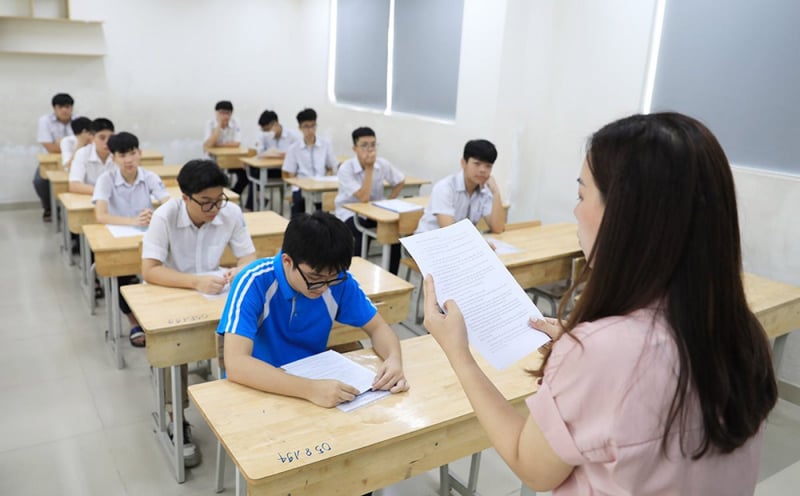Many students and teachers believe that, in theory, eliminating suspension in student discipline is a humane policy, aiming at not abandoning students, using positive discipline to correct students' mistakes, aiming at a happy classroom, a happy school. However, the highest form of discipline for students who violate the law is criticism, warning and writing a self-criticism as in the draft circular, which is not enough to deter dangerous and serious behaviors.
Using forms of student discipline must ensure harmony between humanity and strictness. Illustrative photo
Ms. Nguyen Thuy Lan, a teacher at Truong Dinh High School ( Hanoi ), said she agreed with the removal of the measure of forcing students to leave school for 1 year for violations. Because suspending students for 12 months is too long, it can make them easily fall into other negative things. They also need encouragement, need to maintain their motivation to study, and during this time they also need measures to encourage and connect from teachers and schools.
However, in the current situation, the highest form of discipline for students who violate the law, "writing a self-criticism", is too light. This will cause difficulties for teachers and schools ineducating individual students and students who violate at an "alarming" level.
According to Ms. Lan, positive education does not mean eliminating all forms of discipline, but must combine love and clear limits. Without discipline, students can easily confuse the right to be respected with the right to act without limits. Humanity in education is only truly meaningful when accompanied by responsibility and moral training. Therefore, in addition to the three forms of discipline as in the draft, there must still be the highest form of discipline for students who violate the law, which is "suspension from school for 1 week".
Mr. Tran Trung Hieu, a teacher at Phan Boi Chau High School for the Gifted ( Nghe An ), also said that the complete elimination of strict disciplinary measures such as warnings in front of the whole school, temporary or long-term suspension from school is a "step backward" in the context of increasingly sophisticated and dangerous violations of school rules such as school violence, insulting teachers, cheating on exams, using illegal substances, and abusing social networks to attack classmates and teachers. "Gentle" measures such as warnings, criticism, or writing self-criticism are not enough to deter students with serious violations.
In reality, many students write self-criticisms perfunctorily, but their misconduct continues. When schools do not have strong enough measures to deal with them, the seriousness of education will be eroded, and discipline will become a formality. In addition, eliminating strict forms of discipline also undermines fairness in education and the role of teachers because a loose discipline system will make serious students feel unfair, because their violations are not handled properly. This can easily lead to discouragement, reduced motivation to study and collective spirit.
More worryingly, teachers, who are directly responsible for maintaining order in the classroom, will be severely limited in their ability to deal with students who violate the rules. Without the right tools, teachers will become “powerless” and their prestige and authority will be undermined. This will damage the teaching-learning relationship, which is based on respect and standards of behavior.
Instead of eliminating all forms of strict discipline, Mr. Tran Trung Hieu said that the draft circular should be adjusted to classify violations into three levels: mild, moderate, serious; at the same time, retain some forms of public discipline or temporary suspension from school applied to serious, intentional, and repeated violations.
From an expert perspective, MSc. Nguyen Viet Hien, lecturer at the University of Education, Vietnam National University, Hanoi, member of the Executive Committee of the Vietnam Psychotherapy Association, also affirmed that positive discipline plays an important role in shaping personality, improving social capacity and reducing disciplinary violations in schools in a sustainable manner. Positive discipline is not weakness or tolerance but an educational method based on respect, empathy and encouraging students to develop correct behavior proactively.
In contrast to purely punitive forms of discipline, positive discipline does not aim to hurt or humiliate students, but focuses on helping them understand the consequences of their behavior, recognize their self-worth, and correct their mistakes responsibly. This method is based on the principles of developmental psychology and modern education, with a special emphasis on: Building positive teacher-student relationships; creating a safe environment for students to express their emotions; helping students internalize rules and self-regulate their behavior.
According to Master Nguyen Viet Hien, in the school environment, it is inevitable that students will have deviant and individual behaviors - from violating classroom rules to violent behavior, threatening the safety of friends or teachers.
“In such cases, what does it mean to apply positive discipline? Many teachers also shared with me that they cannot be “gentle” with students, so are they violating the rules of positive discipline? In this case, we still need to strictly handle violations but still maintain the dignity and development opportunities for students.
Teachers need to clearly classify violations, apply restorative disciplinary measures and work closely with families and experts. In some cases, teachers still have to apply public warnings and temporary suspensions for about a week, but at the same time, schools need to create supportive conditions for students to return to the school environment with a more positive mindset, so that students understand that they are still accepted, but the school cannot tolerate wrongdoing," said Master Nguyen Viet Hien.
Source: https://cand.com.vn/giao-duc/co-nen-bo-hinh-thuc-ky-luat-dinh-chi-hoc-tap-doi-voi-hoc-sinh-vi-pham--i768264/



![[Photo] Anh Hoang - Dinh Duc successfully defended the men's doubles championship of the National Table Tennis Championship of Nhan Dan Newspaper](https://vphoto.vietnam.vn/thumb/1200x675/vietnam/resource/IMAGE/2025/5/23/d6ab3bcac02c49928b38c729d795cac6)

![[Photo] Top players gather at the 2025 Nhan Dan Newspaper National Table Tennis Championship](https://vphoto.vietnam.vn/thumb/1200x675/vietnam/resource/IMAGE/2025/5/23/9ad5f6f4faf146b08335e5c446edb107)







![[Video] Launch of the publication "The Teacher and the Books"](https://vphoto.vietnam.vn/thumb/402x226/vietnam/resource/IMAGE/2025/5/23/f8b7526776a44a57b0d4d9213c0c660d)














































































Comment (0)